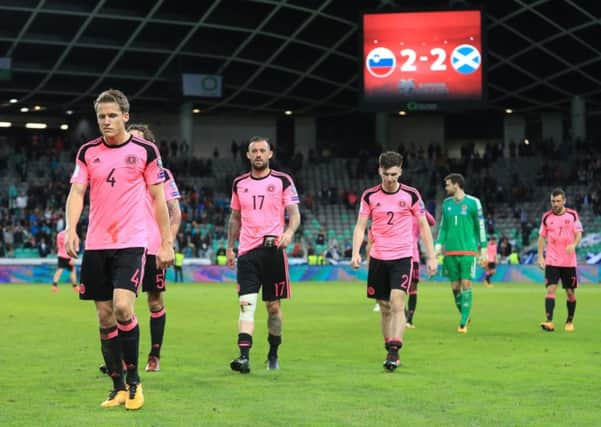Brendan Rodgers blames coaches for Scotland's World Cup woe


The Celtic manager, of course, can take ample consolation from the continuing success of his homeland as Northern Ireland look to follow up their Euro 2016 appearance by winning a play-off to make it to Russia next summer.
But Rodgers has become sufficiently invested in the overall fortunes of Scottish football during his 16 months in the country to both care sincerely about the state of the national team and to offer an informed view of where it is going wrong.
Advertisement
Hide AdAdvertisement
Hide AdHe certainly didn’t pull any punches when asked for his analysis yesterday. The old chestnuts of inadequate training facilities and a basic lack of sufficiently talented players, trotted out so often to explain Scotland’s now 20-year absence from major tournament finals, were dismissed out of hand by Rodgers.
Instead, he laid the blame for Scotland’s failure to maximise what he believes is huge potential firmly at the door of the standard of coaching being applied.
While there was no direct criticism of the now former Scotland manager Gordon Strachan from Rodgers, he made it abundantly clear that he feels the problem lies with those charged with getting the best out of the players available to the international squad.
“It was a missed opportunity,” reflected Rodgers. “There’s no doubt about that. My initial reaction through it all was frustration. I was shouting at the TV. I want the Scotland boys to do well.
“People will always come up and say ‘there’s not the training pitches here’, there’s not this and that. No, it’s not that. I’ve been at Reading where we didn’t have great facilities, been through to world-class facilities at Chelsea, same at Liverpool.
“So I get why you want the best facilities but that’s not what makes the players. They don’t have the great facilities in South America, they don’t even have them in Belgium. So it’s about what you do inside the facilities you have. It’s like in Barcelona, it’s the environment and what they are creating inside it.
“Listen, I don’t want to come up here and people say ‘he’s only been here for 15 odd months or whatever’ but from my position looking in, you’ve got good players here. You have to find a way to teach the kids to develop and play football from a high technical and tactical level and that’s about courage of the coaches.
“So it’s not the players that’s the problem. You’ve got the players, the players are here. Just for one example, the boy Lewis Morgan at St Mirren – he’s quick, dynamic, can press, can run, can get at people. Stuart Armstrong here at Celtic, boys that are quick and can play. So you’ve got the players, it’s about how they are coached and how they are asked to play.”
Advertisement
Hide AdAdvertisement
Hide AdRodgers is adamant the raw materials are there for Scotland to manufacture a much brighter future at international level, a process his friend and former assistant manager at Watford, Malky Mackay, has a key role in developing as the SFA’s performance director.
“Now is a great time to look at it, shine a torch on it,” added Rodgers. “How can we be better? Normally this is how you get great gains. You have to do the same even when you are successful. But certainly there is a great opportunity now to take the country forward.
“That second part of the World Cup campaign was actually very, very good. There is a genuine chance there because there is a group of players who can go on and qualify. There’s no question about that.
“There are young, vibrant, exciting players who have shown in an energetic way that they can do the things you want at that level. Let’s take away all the negativity and frustration and say, ‘How do you move on from here?’
“Then build something over these next couple of years that’s going to allow you to have a vibrant team that’s going to have a real go at doing it. You’ve shown in the second part of the campaign that you can do it. It comes around very quickly.
“It’s about having a clear way of working. What’s your identity of playing, is there a clear identity? That’s what Malky is working on.
“You see it with Northern Ireland, the identity of their team. They have clearly built up and created a spirit these last few years. It comes from winning, it comes from qualifying, but when you see them, ultimately they have got good players with good organisation.”
Rodgers had some sympathy for Strachan with regard to the fall-out which greeted his contentious post-match comments in Slovenia which cited inferior genetics as a cause of Scotland’s woes. But the Celtic boss remained firm in his own contention that technique and tactical awareness are far more significant than sheer physicality.
Advertisement
Hide AdAdvertisement
Hide Ad“I know where Gordon was coming from,” he said. “But at Swansea, I had one player over 6ft 3ins and the rest were 6ft or below. But we were very good technically and tactically.
“Who are the best players in the world? Messi, Suarez, Hazard, Iniesta, Neymar, Verratti. Verratti is 5ft 6ins but he’s not in conflict with the ball. He keeps it.
“That is a part of it but there has also been something over a period of time here that is not necessarily Gordon’s problem. There is an approach here that needs to change. I touched on it last season when I watched Celtic v Rangers under-17s. You had the most talented players smashing the ball up the pitch. It comes from coach education which has always been very good here in Scotland. People come from all over the world to get their badges here but it is about what you do after that.”